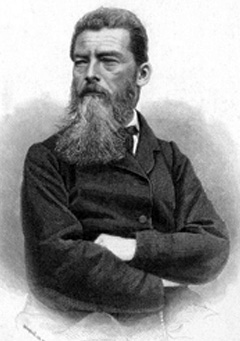| Profile | Major Works | Resources |
Ludwig Andreas Feuerbach, 1804-1872

German philosopher, theologian and socialist.
Ludwig Andreas Feuerbach was born into a scholarly family, his father having been a jurist and professor of criminal law at the Bavarian University of Landshut. Raised in Munich, Feuerbach started off studying theology at Heidelberg, but subsequently switched to philosophy and transferred to the University of Berlin, where he came under the spell of the philosopher G.F.W. Hegel. Feuerbach would go on to form, with Bruno Bauer, Karl Marx, and other Berlin students of Hegel, the core of the "Young Hegelian" movement. .
Feuerbach returned to Bavaria to complete his studies, receiving his doctorate from the University of Erlangen 1828. He submitted his habilitation thesis later that same year, and stayed on at Erlangen as a lecturer. However, Feuerbach's first publication, an anonymous treatise on death and immortality (1830), was deemed irreligious and condemned. In 1832 Feuerbach suspended his teaching, and retired to the rural village of Bruckberg (near Nuremberg), living off his wife's endowment in a porcelain factory, and writing mainly on theology. A 1834 tract of philosophy earned him an invitation to the Hegelian "Critical Society" and Feuerbrach would contribute several pieces to the Hegelian Jahrbuch in 1834 defending Hegel against critics (they would be reprinted as Anti-Hegel in 1835).
Feuerbach would subsequently change tack, and contributed a series of articles to the Halle Jahrbuch in 1839 with would turn Hegelianism around. In his ground-breaking 1839 critique of Hegel's idealism, Ludwig Feueberbach became a proponent of a materialist (or at this point, 'naturalist') conception of history. Feuerbach's work would become highly influential upon Karl Marx, who would take the reversal even further to dialectical materialism.
Feuerbach's most famous work is probably his Essence of Christianity in 1841. The "essence" of Christianity, according to Feuerbach (1841) was merely religious alienation. Succinctly, Feuerbach argued that, as a result of difficult material circumstances throughout history, humans had gradually become alienated from their natural, subjective aspirations towards beauty, truth, wisdom, etc. and therefore created religion as the embodiment of these ideals. However, once "reified" in religion, these ideals had come back to crush human aspirations entirely. As a result, Feuerbach believed that religion had became the only obstacle to the realization of human ideals on earth. A socialist society was only made possible by throwing out religion, thereby permitting humans to "recapture" their own ideals for themselves.
Feuerbach's thesis would lead to replies by Marx (1844, 1846) and Engels (1888). Karl Marx criticized Feuerbach's thesis on the grounds that human projections of religious ideals were mirror images of the imperfections and misery of actual society. Throwing out religion will accomplish nothing unless a socialist society is already in place. Once material circumstances change and improve, Marx argued, the human "need" for religion would disappear.
|
Major Works of Ludwig Feuerbach
|
|
HET
|
|
Resources on Ludwig Feuerbach
|
All rights reserved, Gonçalo L. Fonseca
